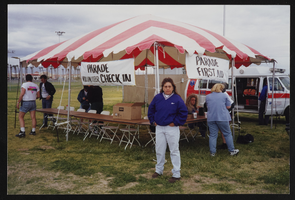Search the Special Collections and Archives Portal
Search Results
Lonnie Pittman oral history interview
Identifier
Abstract
Oral history interview with Lonnie Pittman conducted by Beverly Williams on March 16, 1981 for the Ralph Roske Oral History Project on Early Las Vegas. In this interview, Pittman, an African American man, describes the treatment and living conditions of African Americans in Las Vegas, Nevada during the 1950s. Pittman also discusses the job opportunities available to African Americans, segregation, and the quality of schooling available to African American children at the time.
Archival Collection
Alan Feldman oral history interview
Identifier
Abstract
Oral history interview with Alan Feldman conducted by Claytee White on September 24, 2014 for the Boyer Early Las Vegas Oral History Project. Feldman discusses working for the Culinary Union Local 226 with the Wynn Hotel Properties, and his public relations work in Las Vegas, Nevada. Feldman also talks about notable people in Las Vegas, including Steve Wynn and John Wilhelm.
Archival Collection
Steven Horsford oral history interview
Identifier
Abstract
Oral history interview with Steven Horsford conducted by Claytee D. White on August 19, 2011 for the African Americans in Las Vegas: a Collaborative Oral History Project. Horsford begins by discussing his family's Trinidadian ancestry and how his family came to move to Las Vegas, Nevada in 1969. He describes living in the Berkley Square neighborhood, his education, and how he developed his interest in pursuing a career in politics. Horsford continues, discussing his grandmother, his children, and his experiences growing up in the African American community of Las Vegas. Other topics of discussion include his family traditions, his wife, and attending the University of Nevada, Reno.
Archival Collection
Keith Brantley oral history interview
Identifier
Abstract
Oral history interview with Keith Brantley conducted by Denise Beverstein on October 15, 2015 for the African Americans in Las Vegas: a Collaborative Oral History Project. In this interview, Brantley discusses his personal history and his experiences growing up in Las Vegas, Nevada. He talks about attending Bonanza High School, being involved in school sports, and establishing The Poet’s Corner, a monthly poetry forum, in the late 1990s. Brantley describes what The Poet’s Corner provided for the community, the history of racism in Las Vegas, and discusses the African American experience as the city changed. Lastly, Brantley recites one of his poems,
Archival Collection
Withania Neal oral history interview
Identifier
Abstract
Oral history interview with Withania Neal conducted by Claytee D. White on July 09, 2006 for the Hurricane Katrina Survivors in Las Vegas Oral History Project. In this interview, Neal discusses her upbringing in Las Vegas, Nevada. She remembers attending a sixth grade center, and going to Southern University and A&M College in Baton Rouge, Louisiana. Neal talks about her experience with hurricane season in Louisiana, evacuating, and the development of hurricane Katrina. She describes the broken levees, the flooding of New Orleans, and the chaos that followed. Lastly, Neal recalls the weeks after the hurricane, damaged homes, and the process of rebuilding the community.
Archival Collection

Second annual Gay Pride Parade check-in, image 002: photographic print
Date
Archival Collection
Description
Image
Howard Heckethorn oral history interview
Identifier
Abstract
Oral history interview with Howard Heckethorn conducted by Richard Eitland on February 15, 1979 for the Ralph Roske Oral History Project on Early Las Vegas. Mr. Heckethorn describes going to school in the early days of Las Vegas, Nevada. He also talks about many notable teachers he had, as well as the development of the Las Vegas area. Heckethorn also discusses his arrival to Las Vegas, Nevada in 1930, and recalls the Old Mormon Fort, El Rancho, The Last Frontier, and the tourism that gambling brought to the city. Heckethorn discusses the 1960s, and the impact Howard Hughes had in the development of hotels and casinos.
Archival Collection
Wilma Noyes oral history interview
Identifier
Abstract
Oral history interview with Wilma Noyes conducted by Claytee D. White on April 11, 2007 for the Boyer Early Las Vegas Oral History Project. In this interview, Noyes discusses her personal history and life in Las Vegas, Nevada from the 1920s onward. She describes moving to Las Vegas with her family in 1921 after her father got a job working for Union Pacific Railroad Company. Noyes explains how the railroad provided housing to its workers and what life was like in that housing. Noyes discusses attending the first schools in Las Vegas, one of them having had Maude Frazier as its principal. Noyes then describes what young people did for entertainment in Las Vegas, including dancing and going to movie theaters. Lastly, she discusses the history of the casinos and how the city has changed.
Archival Collection
Randy Lavigne oral history interview
Identifier
Abstract
Oral history interview with Randy Lavigne conducted by Stefani Evans and Claytee D. White on August 23, 2016 for the Building Las Vegas Oral History Project. Lavigne discusses working as the Executive Director of the American Institute of Architects (AIA) Las Vegas since 1997. She also talks about the Fifth Street School’s plans to celebrate the AIA Chapter's sixtieth anniversary; the now defunct auxiliary organization, the Architects' Wives League, and various topics having to do with architecture as a profession and architectural firms.
Archival Collection
John Pappas oral history interview
Identifier
Abstract
Oral history interview with John Pappas conducted by Adrienne O'Neal on March 02, 1980 for the Ralph Roske Oral History Project on Early Las Vegas. In this interview, Pappas candidly discusses his career as a dealer working in various casinos in Las Vegas, Nevada. Pappas describes the differences between dealing in illegal gambling operations in New York City, New York and dealing for casinos in Las Vegas. Pappas discusses the differences between law enforcement in Las Vegas and on the east coast, and how he feels law enforcement is prejudiced against Italians. Pappas also discusses how he feels politics and minority groups have changed New York City for the worse.
Archival Collection
